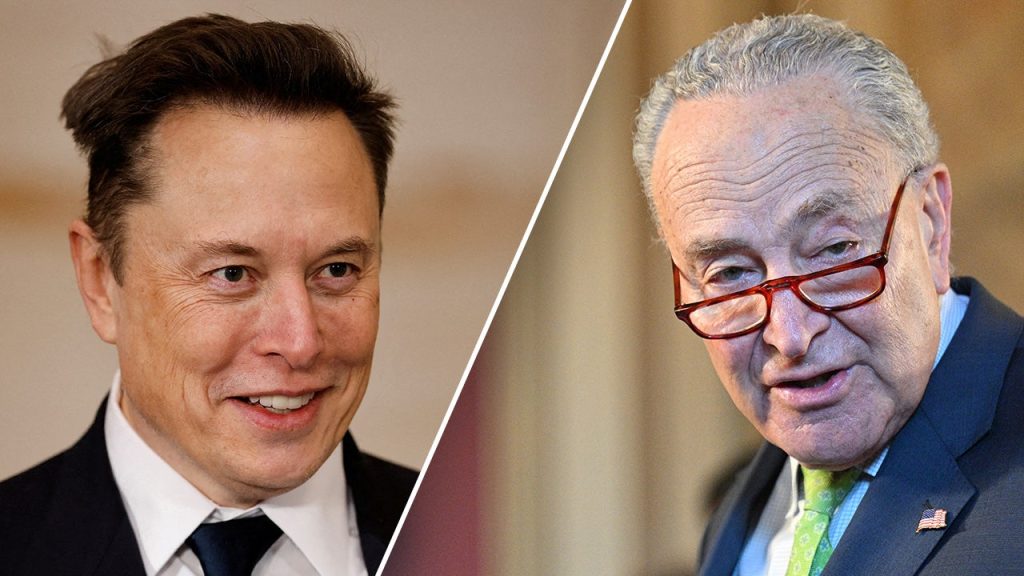Senate Minority Leader Chuck Schumer expressed deep concerns about the influence of wealthy “oligarchs” on American politics during an appearance on “The View” on Tuesday morning. This statement comes in the wake of reports detailing significant financial contributions made by billionaire George Soros to Schumer’s political efforts. Schumer’s remarks highlight the complexities of political financing and the ongoing debate over the role of wealth in shaping policy and governance in the United States.
| Article Subheadings |
|---|
| 1) Schumer’s Concerns About Oligarchs |
| 2) Connections Between Soros and Schumer |
| 3) Political Implications of Wealthy Donors |
| 4) The Public Debate Around Oligarchy |
| 5) Schumer’s Responses to Recent Criticism |
Schumer’s Concerns About Oligarchs
During his appearance on “The View,” Chuck Schumer voiced significant apprehensions regarding what he perceives as the growing power of oligarchs in the United States. He stated, “I wake up at 3 in the morning sometimes so worried about the future of this country under these oligarchs.” Schumer’s comments reflect a broader concern amongst some political leaders about the concentration of wealth and its potential to manipulate democratic processes. The term “oligarch” generally refers to individuals who hold significant influence and power, often related to their wealth and financial resources. It brings to light urgent questions about equity, representation, and governance in American politics, particularly as billionaires increasingly play pivotal roles in funding political campaigns and shaping policies.
Connections Between Soros and Schumer
Amidst concerns over oligarchs, the ties between Schumer and billionaire George Soros are particularly noteworthy. Soros, known for his extensive philanthropic efforts and political contributions, has notably funded Schumer’s Senate Majority PAC, contributing millions for various electoral campaigns. Reports indicate that Democracy PAC II, which is mainly backed by Soros, donated $2.5 million to the Senate Majority PAC in 2024, with prior contributions amounting to $6 million over the two preceding years. This financial involvement has led to scrutiny regarding the influence of wealth on Schumer’s political agenda. Critics might argue that such significant donations create a conflict of interest, as policies could skew in favor of ultra-wealthy donors rather than the average citizen.
Political Implications of Wealthy Donors
The growing prominence of wealthy individuals in American political funding is changing the landscape of democratic engagement and representation. As Schumer himself has utilized campaign funds from prominent billionaires, it raises pertinent questions about transparency and accountability in politics. While major donations can bolster campaigns, they often bring scrutiny regarding the potential for quid pro quo arrangements, where policies might disproportionately favor the interests of private donors. This environment contributes to an escalating discourse about the challenges of systemic reform, as politicians face mounting pressure to address the influence of money in politics while simultaneously relying on these same funds for electoral viability.
The Public Debate Around Oligarchy
In a political climate charged with dialogues about oligarchy, Bernie Sanders has emerged as a vocal critic of the concentration of wealth and its implications for democracy in America. Sanders’s rallies, titled “Fighting Oligarchy,” attract thousands of supporters and exemplify a burgeoning movement among progressives advocating for equitable governance that prioritizes the needs of the populace over the interests of the wealthy. This public debate also surfaced during the 2024 elections, where issues of wealth influence were significant talking points. As politicians like Sanders voice concerns over the oligarchy, it presents a critical juxtaposition against the backdrop of electoral dependence on wealthy donors, cultivating a tension within the Democratic Party and the broader political milieu regarding how to navigate this complex issue.
Schumer’s Responses to Recent Criticism
In addition to his appearances where he expresses concerns over oligarchs, Schumer has also faced significant backlash regarding his political decisions, particularly concerning funding the government. On “The View,” he defended his vote for a Republican spending bill that aimed to avert a government shutdown, clarifying that this decision was made on strategic grounds to prevent further turmoil. His comments evince Schumer’s understanding of the delicate balance he must maintain between maintaining party loyalty and addressing broad governance concerns. His assertions regarding opposition from wealth-driven initiatives, coupled with his reliance on donations from significant figures, illustrate the complexities faced by leaders as they reconcile their roles amidst a socio-political landscape heavily marked by financial influence.
| No. | Key Points |
|---|---|
| 1 | Schumer expresses concern over oligarchs influencing American politics. |
| 2 | Soros’s financial contributions to Schumer’s campaigns raise questions about influence. |
| 3 | Wealthy donors increasingly shape political landscapes and policy decisions. |
| 4 | Public debates about wealth and political power highlight tensions within the Democratic Party. |
| 5 | Schumer defends controversial political decisions amid criticism from peers. |
Summary
The dynamics of wealth in American politics continue to provoke meaningful discourse concerning democracy and representation. As Chuck Schumer navigates his political responsibilities while confronting allegations of undue influence from affluent donors like George Soros, the broader discussion about oligarchy and political financing grows increasingly relevant. The discussions facilitated by public figures emphasize a crucial examination of how political campaigns and governance may be shaped by economic power, prompting ongoing debates about reform and accountability in the evolving political landscape.
Frequently Asked Questions
Question: What concerns did Chuck Schumer raise about oligarchs?
Schumer expressed worries about the influence of oligarchs on the future of American democracy, indicating that the concentration of wealth poses a threat to equitable representation and governance.
Question: How has George Soros contributed to Schumer’s political campaigns?
Soros has significantly funded Schumer’s Senate Majority PAC, contributing millions over the years, raising questions about the implications of such financial ties on political decision-making.
Question: What is the public sentiment regarding political donations from wealthy individuals?
Public sentiment is increasingly critical, with many advocating for reforms to address the concentration of financial influence in politics, as this trend may undermine democracy and fair representation.


